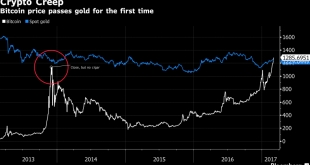The Economist reports about government initiatives aimed at using blockchain technology in the public sector. Possible uses include land registries, identity-management systems, health-care records, or elections. Proponents expect the technology to improve efficiency and transparency and foster trust. Adoption requires significant investments. According to a survey “nine in ten government organisations say they plan to invest in blockchain technology to help manage financial transactions,...
Read More »Smart Ponzi Games in the Blockchain
On the FT’s Alphaville blog, Izabella Kaminska points to a paper by Italian academics arguing that the Ethereum technology tends to incubate Ponzi schemes. The uniqueness of the “smart Ponzi” is its capacity to protect the identity of the initiator but also its ability to persist even after being exposed. Since contracts are unmodifiable and thus unstoppable there is no central authority to terminate the execution of the scheme or force the initiator to refund victims. What’s more, the...
Read More »Does Decentralized Intermediation Add Value?
On the FT’s Alphaville blog, Izabella Kaminska questions the value of decentralization (and thus, blockchain technology) in intermediation. Decentralisation is, in almost all cases, not an efficiency. To the contrary, it’s a cost that adds complexity and creates an unnecessary burden for both users and operators unless centralised layers are added on top of it — defying the whole point. … At the end of the day, there are only two groups of people prepared to go to costly lengths to...
Read More »Digital Gold – For Now Caveat Emptor
Digital Gold On The Blockchain – For Now Caveat Emptor – Bitcoin surpasses gold price – a psychological and arbitrary headline – Royal Mint blockchain gold asks you to trust in the UK government – Royal Canadian Mint and GoldMoney blockchain product asks you to trust in government and the technology, servers, websites etc of the providers – Invest in a gold mine using cryptocurrency – but wait until 2022 for your gold...
Read More »Bitcoin Unlimited
On Bloomberg, Yuji Nakamura and Lulu Yilun Chen report about conflicting views in the Bitcoin community on how to address capacity limits in the blockchain. Bitcoin Unlimited is essentially a software upgrade to the blockchain. Years ago, bitcoin’s early developers imposed a cap on the amount of data it could process. While that slowed down the network, it was seen as a necessary safety measure against potential attackers who could overload the system. Now, Unlimited supporters say the...
Read More »“Should Central Banks Fear the Blockchain?,” European Financial Review, 2017
The European Financial Review, February-March 2017. HTML, PDF. See the VoxEU article.
Read More »Digital Gold – For Now Caveat Emptor
Digital Gold On The Blockchain - For Now Caveat Emptor - Bitcoin surpasses gold price - a psychological and arbitrary headline - Royal Mint blockchain gold asks you to trust in the UK government - Royal Canadian Mint and GoldMoney blockchain product asks you to trust in government and the technology, servers, websites etc of the providers - Invest in a gold mine using cryptocurrency - but wait until 2022 for your gold and trust the miners that it is there - Blockchain and gold will...
Read More »Vollgeld, the Blockchain, and the Future of the Monetary System
Presentation at the Liechtenstein Institute about the Vollgeld initiative, the blockchain revolution, and their possible effects on banks and the monetary system. Report in Liechtensteiner Vaterland, February 1, 2017. HTML. Interview in Wirtschaft Regional, February 4, 2017. PDF.
Read More »Krypto Currencies and Privacy
On Wired, Andy Greenberger discusses Monero, Dash, and Zcash, krypto currencies that provide more privacy than bitcoin and its derivatives. Unlike commercial services like PayPal, Bitcoin allows anyone to spend money online without providing identifying details. But if someone’s Bitcoin address is linked with their real identity, any transaction from that address is entirely visible on the public blockchain … Hiding those transactions requires taking extra steps, like routing bitcoins...
Read More »“Wer hat Angst vor Blockchain? (Who’s Afraid of the Blockchain?),” NZZ, 2016
NZZ, November 29, 2016. HTML, PDF. Central banks are increasingly interested in employing blockchain technologies, and they should be. The blockchain threatens the intermediation business. Central banks encounter the blockchain in the form of new krypto currencies, and as the technology underlying new clearing and settlement systems. Krypto currencies bear the risk of “dollarization,” but in the major currency areas this risk is still small. New clearing and settlement systems benefit...
Read More » Swiss Economicblogs.org
Swiss Economicblogs.org

